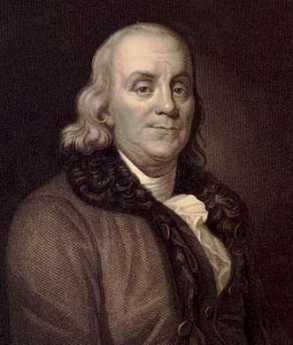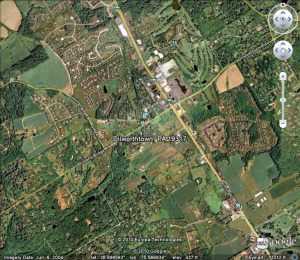Related Topics
Benjamin Franklin
A collection of Benjamin Franklin tidbits that relate Philadelphia's revolutionary prelate to his moving around the city, the colonies, and the world.

Delaware (State of)
 Originally the "lower counties" of Pennsylvania, and thus one of three Quaker colonies founded by William Penn, Delaware has developed its own set of traditions and history.
Originally the "lower counties" of Pennsylvania, and thus one of three Quaker colonies founded by William Penn, Delaware has developed its own set of traditions and history.
The British Attack Philadelphia
Fighting in the Revolutionary War lasted eight years; for two years (June 1776 to June 1778) Philadelphia was the main military objective of the British.
City of Rivers and Rivulets
Philadelphia has always been defined by the waters that surround it.
Touring Philadelphia's Western Regions
Philadelpia County had two hundred farms in 1950, but is now thickly settled in all directions. Western regions along the Schuylkill are still spread out somewhat; with many historic estates.
Pacifist Pennsylvania, Invaded Many Times
Pennsylvania was founded as a pacifist utopia, and currently regards itself as protected by vast oceans. But Pennsylvania has been seriously invaded at least six times.
Battle of the Clouds: September, Remember

|
| Dilworthtown |
Weather satellites, television and so on have taught us much about hurricanes that was unknown in 1777. Benjamin Franklin, it should be noted, was the first to observe that Atlantic Coast "Nor'easters" actually begin in the South and work North, even though the wind seems to be blowing in the opposite way; what's moving toward the northeast is a low-pressure zone. We now know that hurricanes begin in Africa, travel West and then veer North when they reach Florida. A great deal is still to be learned about hurricanes, but the most important thing about their timing is contained in a maritime jingle:
June, too soon.
July, stand by.
And then: September, remember.
October, all over.
Along the Atlantic east coast, the end of August to the middle of September, is hurricane season. That's when houses blow down in Florida, and heavy rains hit Pennsylvania. Admiral Howe might have had some clue to this, since Franklin made his observation around 1750, and storms are important to Admirals. But very likely his brother the General just thought it was one of those things when the British landing at Elkton, Maryland in late August 1777 was greeted with an unusually severe downpour of rain. Howe had planned to surprise Philadelphia from the rear by hitting the ground running on horseback. However, he underestimated the debilitating effect on the horses of three weeks at sea on sailboats; to unload and forage horses during a hurricane was almost too much for the plan. For that purpose, he had given orders for the troops to disembark without waiting to pitch camp, or unpacking their gear. But the drenching rain gave Washington several extra days to organize a defense, although he has been given too little credit for the strenuous accomplishment of moving an army from Bucks County to the banks of the Brandywine in that weather. Howe, whose trademark was surprise, deception, outflanking, had anticipated a sudden cavalry thrust into the backyards of unprepared Philadelphia. What he got was 2000 casualties in the biggest battle of the Revolutionary War, against Washington's well-prepared defense along the steep-sided Brandywine Creek.
Howe won this battle, in the sense that Washington was forced to withdraw, because Howe employed another British military trademark, of driving his own troops beyond humane limits in a huge outflanking movement. The countryside around Kennett Square is hilly and broken almost to West Chester, and the American Army felt reasonably prepared along a front of ten or twelve miles. But Howe drove the main force of his army seventeen miles to the north, to Dillworthtown, before turning the unprepared American right flank. And, in the now hot August weather in full uniform and battle pack, the drive continued for twenty-four consecutive hours until Washington saw he had to withdraw. This was what the British meant when they boasted of seasoned regular troops; you win by enduring more than your opponent can endure.
One has to have equal admiration for Washington. Although he was dislodged from his position, losing the opportunity to catch the British in a hostile region without a reliable source of supplies once the fleet weighed anchor, he preserved his army of marksmen and deer hunters intact during the retreat. The two armies started at roughly the same size, and Washington had only about 1300 casualties; his men had more certain supply sources, and they were fighting for their homes. The British, somewhat outnumbered, had the prospect of fighting their way without resupply through an enemy's home territory, capturing the enemy's capital, but still facing the possibility that the British fleet might not get past the Delaware River defenses. If that happened, they could celebrate their victory by starving to death. Just about the only weakness of the Continental Army was its discomfort with bayonet warfare. They could hit a squirrel at a hundred yards, but those long bayonets on the end of very long muskets were designed to protect foot soldiers from cavalry charges. It takes training to put the butt of the musket against a stone on the ground, hold your ground against an oncoming gallop of horsemen, and trust that at the last moment the horses will rear back and throw the riders. But it also takes naked bravado to wave a sword and ride full tilt into a forest of pointing bayonets, trusting that at the last moment the defenders will break and run.
But Washington knew what he was doing. He pulled the troops back to Chester, then over the Schuylkill to the Germantown encampment at Fox and Queen Lane, then up the Schuylkill to Norristown, the first ford in the river that Howe must use when the boats and bridges were destroyed. The river would hold the British while the Americans came at them from the rear; this was essentially the same river strategy he used at the battle of Trenton. Washington picked his battlefield in Chester County and got ready to fight the second installment of the Battle of Brandywine. The campus of Immaculata University now occupies the site.
And then it rained, again. Hard. The gunpowder on both sides was soaked, useless. In what has come to be known as the "Battle of the Clouds", the fighting was called off by mutual agreement. The second hurricane of the year had arrived, and Washington more or less helplessly had to watch Howe take over Philadelphia unopposed. He lost the capital, provoking dismay among the colonists, but his masterful strategy taught the British to respect him. When the British were later considering whether to hold or abandon Philadelphia, this growing respect for their adversary helped tilt their thinking toward prudence.
But that was not before Howe once more showed he too was not the lazy slacker that others had called him. General "Mad Anthony" Wayne was dispatched with fifteen hundred troops to hassle the rear of Howe's army. Wayne was confident he could hide his troops in the Radnor area where he had been brought up, but the region in fact had many Torys to report his movements. Howe ordered Major General Lord Charles Grey to take the flints from his troops' muskets, attack the American camp near Paoli's tavern in the night, and use only bayonets. Waynes' troops were scattered and slaughtered, in what came to be known as the Paoli massacre.
Originally published: Friday, June 23, 2006; most-recently modified: Friday, September 20, 2019
| Posted by: Allyson | Apr 3, 2009 9:47 AM |
Sincerly,
*amy*
| Posted by: Amy | Oct 3, 2008 10:06 PM |
Sincerly,
*Amy*
| Posted by: Amy | Oct 3, 2008 10:00 PM |